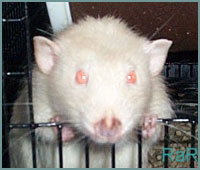| Mycoplasma Pulmonis Mycoplasma pulmonis, commonly referred to as "myco," is probably the most common medical problem for pet rats. All rats with the exception of barrier-isolated Specific Pathogen Free lab rats have myco, but some have a higher resistance to the bacteria than others. Some rats will never have an active myco infection while others will have chronic myco their entire lives. Myco needs to be treated with antibiotics immediately. Left untreated, myco can cause pneumonia, lung scarring, and death. Some ways to help prevent myco infections are to use a bedding that has very little dust and never use one that contains cedar or pine. Always keep your rats' bedding clean. Do not allow ammonia build-up. Don't expose your rats to dramatic changes in temperature. Do not house them in a cage that is too small. Feed a well balanced diet and offer them plenty of mental stimulation. Symptoms include: Sneezing, porphyrin stains around nose or eyes (a secretion with a red pigment from a Harderian Gland behind the rat's eye that many people mistake for blood), respiratory noises. In severe cases, gasping, hunched back, rough coat, labored breathing.  Porphyrin stains around the nose. Sneezing is generally one of the initial symptoms of upper respiratory disease, however some rats with chronic myco will go right to the advanced respiratory noises. Prompt veterinary diagnosis and treatment is essential. More information here: http://www.rmca.org/Articles/myco.htm and here: http://www.rmca.org/Articles/respir.htm and here: http://hometown.aol.com/MMCart3475/Myco.html Recommended treatment: I start with milder antibiotics and work up, as needed. If you have a rat who is showing signs of a mild myco infection (i.e. constant sneezing, porphyrin) start with just Doxycycline. Many times, that's all it takes to knock out a mild infection. If you have a rat who is percolating or has other respiratory noises along with the other signs of myco, go right to a combination of Enrofloxacin (Baytril) and Doxycycline. If the Baytril and Doxycycline are ineffective after a full course of treatment, move on to Azithromycin (Zithromax) and Doxycycline. If you have a rat who has advanced myco (i.e. sneezing, porphyrin, severe respiratory noises, rough coat, lethargy, possibly gasping attacks) you may need to move on to a bronchodilator such as Aminophylline or Theophylline. (Note: Do not use fluoroquinolones such as Baytril in conjunction with a bronchodilator. Macrolides such as Zithromax are safe to use in conjunction with a bronchodilator.) If your rat is gasping, oxygen should be administered ASAP. Nebulizing medications is also effective for rats with advanced myco. Amikacin and liquid Baytril are both very effective when nebulized. Basically, you need to put them on the antibiotic or combination of antibiotics for a full two week treatment and, if ineffective, move on to something different or stronger. You want to hit them hard and fast (based on their level of infection) and then get them off of the meds. Never stop in the middle of treatment, even if symptoms disappear, and never wean them off of the medication. It's also very important to have them on the correct dose of medication. Underdosing can be just as harmful as not treating at all. Note: Baytril and Doxycycline are not recommended for rats under 4 months of age or for pregnant and nursing does. Dosages: Adults: • Baytril - 5mg/kg to 10mg/kg twice per day • Zithromax - 8.8mg/kg to 17.6mg/kg twice per day • Doxycycline - 2.5mg/kg to 5mg/kg twice per day Bronchodilators: • Aminophylline - 2.5mg/kg to 5 mg/kg two or three times per day • Theophylline - 2.5mg/kg to 5mg/kg once or twice per day Note: Aminophylline is a fast-acting drug with a shorter duration. Theophylline is slower-acting with a longer duration. Rats under 4 months of age: • Zithromax - 8.8mg/kg to 17.6mg/kg twice per day or • Tylosin (Tylan) - 10mg/kg twice per day (Do not treat in the drinking water) Pregnant and nursing does: • Zithromax - 8.8mg/kg to 17.6mg/kg twice per day or • Tylosin (Tylan) - 10mg/kg twice per day (Do not treat in the drinking water) Nebulizing Medications: Here is some information on setting up a nebulizer at home: Nat's Nebulizer Here are some places to purchase nebulizers: http://www.petiatric.com/catalog/medical.html or http://www.lambriarvet.com/catalog/bird.htm (near the bottom of the page) Note: You will want a 0.5-5 micrometer particle size to nebulize rats. Human or small animal nebulizers are not effective. Dosages for use in nebulizers are the same as the oral dose. Good choices for nebulization are liquid Baytril or Amikacin. Nebulized medications should be nebulized along with Aminophylline so that the airways will remain open and the rat will get the most benefit from the medication. Dosages: • 2.27% Baytril - 2.5mg/kg to 5mg/kg • Amikacin - 2mg/kg to 5mg/kg • Aminophylline - 2.5mg/kg to 5 mg/kg Information on using Albuterol: http://www.rmca.org/Articles/albuterol.htm Oxygen: Any purple, blue tone or paleness of the lips, ears or feet indicates an IMMEDIATE need for oxygen. Your vet should use 8L per minute when in distress until color improves and 5L per minute for maintenance. More Information on Medications and Dosages at: The Layman's Medication Guideline For Use In Rats To link to this page: http://www.raisinrats.com/medical/myco.html [back to top] |